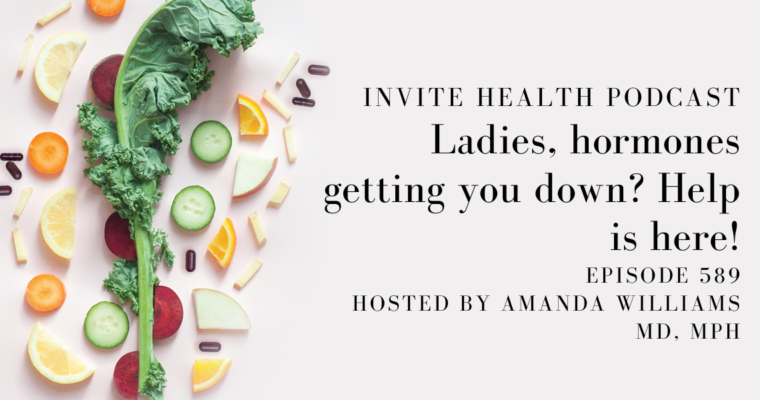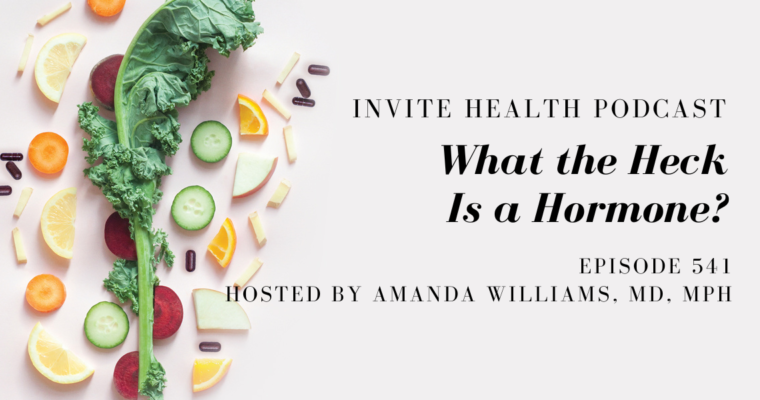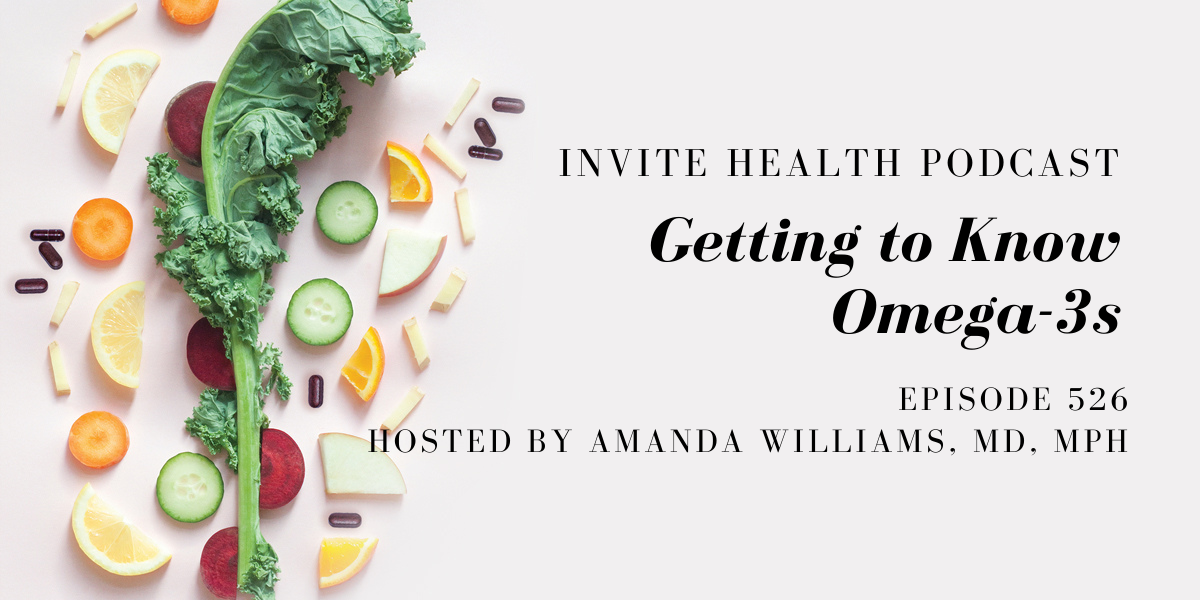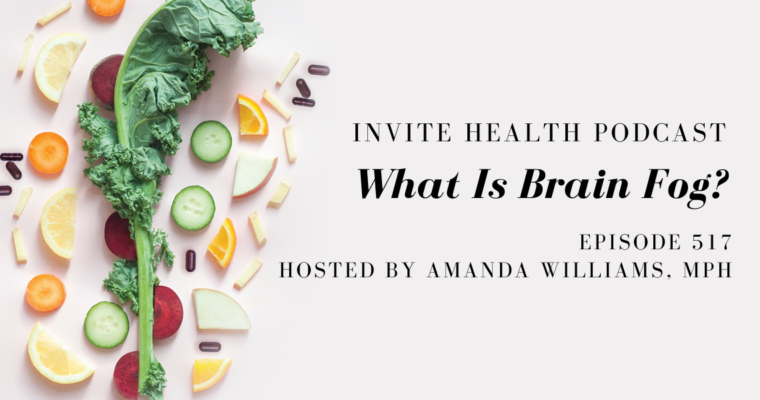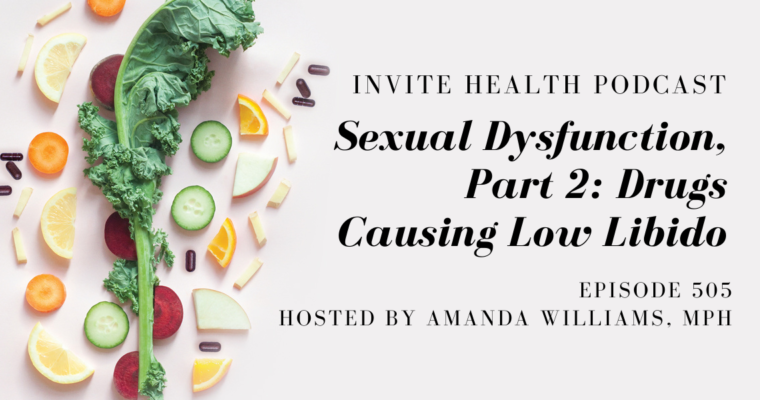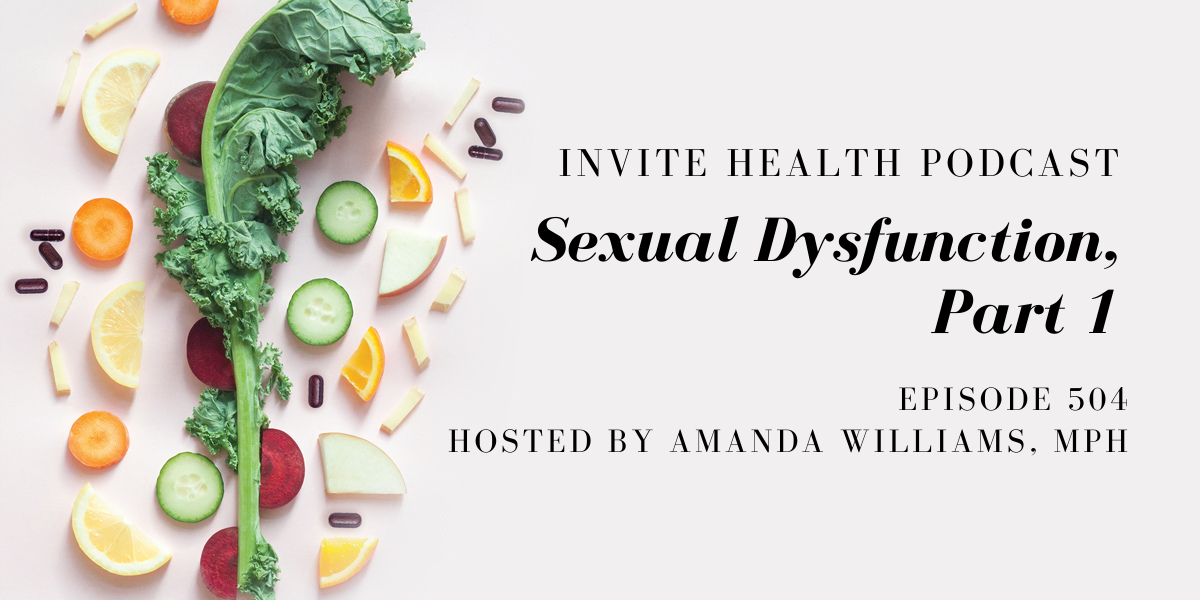sexual dysfunction
Subscribe Today!
Please see below for a complete transcript of this episode.
Sexual Dysfunction, Part 1 – InViteⓇ Health Podcast, Episode 504
Hosted by Amanda Williams, MPH
*Intro music*
InVite Health Podcast Intro: Welcome to the InViteⓇ Health Podcast, where our degreed healthcare professionals are excited to offer you the most important health and wellness information you need to make informed choices about your health. You can learn more about the products discussed in each of these episodes and all that InViteⓇ Health has to offer at www.invitehealth.com/podcast. First time customers can use promo code PODCAST at checkout for an additional 15% off your first purchase. Let’s get started!
*Intro music*
Amanda Williams, MPH: [00:00:40] Everyone’s heard the stories about low sex drive, low libido, erectile dysfunction. So what are we really talking about? We’re talking about sexual dysfunction, and today I want to highlight some of the key statistics and causative reasons. And then in Part 2, I’m going to really get specific with certain medications that we know are directly linked and you will be absolutely astonished by how many medications are linked to sexual dysfunction in both men and women. So I’m Amanda Williams, MD, MPH, and let’s get right to it. Let’s talk about sexual dysfunction.† [00:01:17]
[00:01:18] Let’s first talk a little bit about the statistics when it comes to sexual dysfunction. Now, according to the Cleveland Clinic, and you can look at a lot of different statistical data out there, that sexual dysfunction, to some degree, affects over 40% of women and over 30% of men. Now we know that this is a major problem because I know that this is in many regards taboo to talk about it and people don’t like to to bring up the conversation of sex. It’s interesting because you will find that men are more likely to speak with their physician than women when it comes to sexual dysfunction. So looking at stats coming from University of Michigan, we know that when you think about the topic of sex, this is a very important emotional action, and University of Michigan kind of dove into this in a a bit more detail, talking about the impact of sex on emotional well-being and finding that over 76% of adults over the age of 65 agreed that sex is a very important part of their romantic relationship at any age. So many times people think that as you get older, for some reason, sex is no longer important, and we know that this is certainly not the case based off of all of the the data that has been taken through various different studies and, and research.† [00:02:56]
[00:02:57] So what is sexual dysfunction and why is it that it affects so many men and women? Well, you can look at different types of sexual dysfunction. You can look at just a general lack of interest in sex. You can look at issues with maybe you have an interest, but you have a problem when it comes to becoming physically aroused. So that’s the arousal disorder component of sexual dysfunction. We can look at issues that usually affects women, and that is painful intercourse. So obviously the interest is going to go down. So we know that there are many different ways in which sexual dysfunction can arise. We can certainly look at the many different physical causes when you look at diabetes, heart disease, high blood pressure. And of course, in Part 2, I’m going to talk about all of the different medications, and this, like I said, it’s absolutely fascinating when you see how many different drugs can actually impact this. So many people, you know, think about just solely erectile dysfunction and men and think about, you know, Viagra and Cialis. But there are many other components when it comes to this and seeing the clinical research, and I’ve done a lot of independent studying on, on different research trials and studies when it comes to this. And it’s really interesting that many of the studies overlook the the drug component to this, the implication that a medication that someone is taking may actually have. And so this is why I wanted to talk about this in some some detail today.† [00:04:53]
[00:04:53] So when we think about sexual dysfunction in women, we know that this is generally going to be more pronounced than in men. Now, oftentimes people can look at hormonal fluctuations in women going through menopause and then, you know, libido goes down post-menopausally in many women and you have to look at the hormonal connection as to why that is. Well, we can look at the estrogen component to that and we can look at issues with vaginal dryness and painful intercourse. So there’s a lot of different reasons as to why female sexual dysfunction seems to be more prevalent than in males. But, nevertheless, we know that this is common in both men and women. So how exactly it develops over time is going to vary from one person to the next. Like I said, you can have issues with hormonal imbalances. You can have issues when it comes to a particular chronic disease state that perhaps that you are dealing with. And at the end of the day, it certainly can have an impact on someone’s overall sense of well-being. And there’s a lot of different emotions that go with this. There can be embarrassment. You certainly hear about this quite often in men who are experiencing issues with vaginal dryness.† [00:06:15]
[00:06:16] But we have to look at how hormones, antioxidants, perhaps the lack of nitric oxide released for proper vascular blood flow, how all of these things, we can look at our neurotransmitters and see how those are implicated. So it’s multimodal and looking at key nutrients that we know can be beneficial. You can look at something such as maca root extract and certainly seeing how that can help to support the neurotransmitters in the brain and help the body better manage stressful situations, whether that be emotional or physical, which can certainly help to improve on the side of libido, for example. So looking at erectile dysfunction, and as I mentioned, men are more likely to go in and speak to their physician in regards to this.† [00:07:13]

[00:07:13] Now we can certainly look at erectile dysfunction being clearly linked to issues with hormonal status in men, so lack of testosterone. We can look at diabetes being a really big problem. We can certainly look at cardiovascular issues such as hypertension, and we can also look at underlying components when it comes to anxiety, when it comes to stress. So there’s, like I said, it’s multimodal, and it’s usually not just one thing, it’s many different things. So the approach to managing sexual dysfunction, whether that be in women or in men, has to usually be multimodal as well. And you can look at even the Mayo Clinic, they talk about the utilization of arginine, which is the very important amino acid when it comes to the activation of nitric oxide synthase, which will help with the release of nitric oxide. And I believe on the Mayo Clinic website for erectile dysfunction, they advise upwards of 5000mg of arginine for men who are experiencing erectile dysfunction. And the point of that is to really try to enhance the the blood flow to achieve and maintain an erection.† [00:08:26]
[00:08:27] But we can look at other things, too. We can look at maca root extract once again. There are many different nutrients, and so you can look at the Men’s Edge formulation, which I always mention even though the name is Men’s Edge, this is a wonderful formulation for both men and women because the nutrients that are contained within the Men’s Edge formulation have been studied in both men and women. And so I think that the name sometimes makes people think, “Oh, well, maybe I’m a female and that’s not geared towards me.” That certainly is not the case. You can look at icariin, for example, which is contained in the Men’s Edge formulation, and we know that this has certainly been studied in the setting of women and sexual dysfunction. We can look at, of course, Tribulus extract and seeing the benefit in both men and women. Certainly looking at the, the maca root extract. So there are many nutrients contained within the Men’s Edge formulation that certainly are cross-functional when it comes to addressing sexual dysfunction in both men and women.† [00:09:36]
[00:09:38] You know, basic nutrients certainly can make a difference to if we have at a cellular level, a deficiency in, you know, key vitamins, minerals. These too can also have implications when it comes the exacerbation of sexual dysfunction in both men and women. So we know that this is very common. We know that there are many different approaches to this. I always encourage people to make sure that they have their comprehensive hormone levels tested. So whether male or female, you know, do the full panel. Look and see what’s going on with your estradiol. Look and see what’s going on with your free testosterone, your DHEA, your sex hormone binding globulin. Oftentimes, you may find that there is a issue in terms of the conversion of a particular hormone, and there may be a nutrient that would be incredibly supportive to that. So DHEA is kind of a big one in women. When DHEA levels start to plummet, the reestablishment of DHEA can help to restore some balance when it comes to like a positive feedback loop back up to testosterone as well as estrogen.† [00:10:49]
[00:10:50] So there are many different ways to which you can approach this. But the more that you know, the better off you are. So is it hormonal? Is it a mood disorder? Is it an issue where it is a pharmaceutical implication, whether it’s the medication that you’re taking, that’s actually creating this. And so we know many women deal with this, we know many men deal with this. This is a significant issue that many do not want to talk about, but certainly can have a lot of impact on your overall sense of well-being. And as we grow older, I always say the point is to age gracefully, so we don’t want to create in a particular situation to which we can manage it, but yet we just ignore it and that has effect on our emotional well-being. So while it is a topic that many people don’t like to talk about, I find it to be incredibly important. And that’s why I wanted to talk about that today. So that is just kind of the basic statistics. We know it’s relevant. We know it’s prevalent and we know that there are many things that we can be doing for this. So in Part 2, I’m going to get into the full list of the many medications. Like I said, you will be absolutely astonished by how many medications can create problems when it comes to sexual dysfunction. So make sure that you tune in to Part 2, where I’m going to list all of the many medication.† [00:12:29]
[00:12:30] So for today, I just want to thank you so much for tuning in to the InViteⓇ Health Podcast. Remember, you can find all of our episodes for free wherever you listen to podcasts or by visiting invitehealth.com/podcast. Do make sure that you subscribe and you leave us a review. You can follow us on Facebook, Twitter and Instagram @invitehealth and we will see you next time for Part 2 of sexual dysfunction.† [00:12:30]


